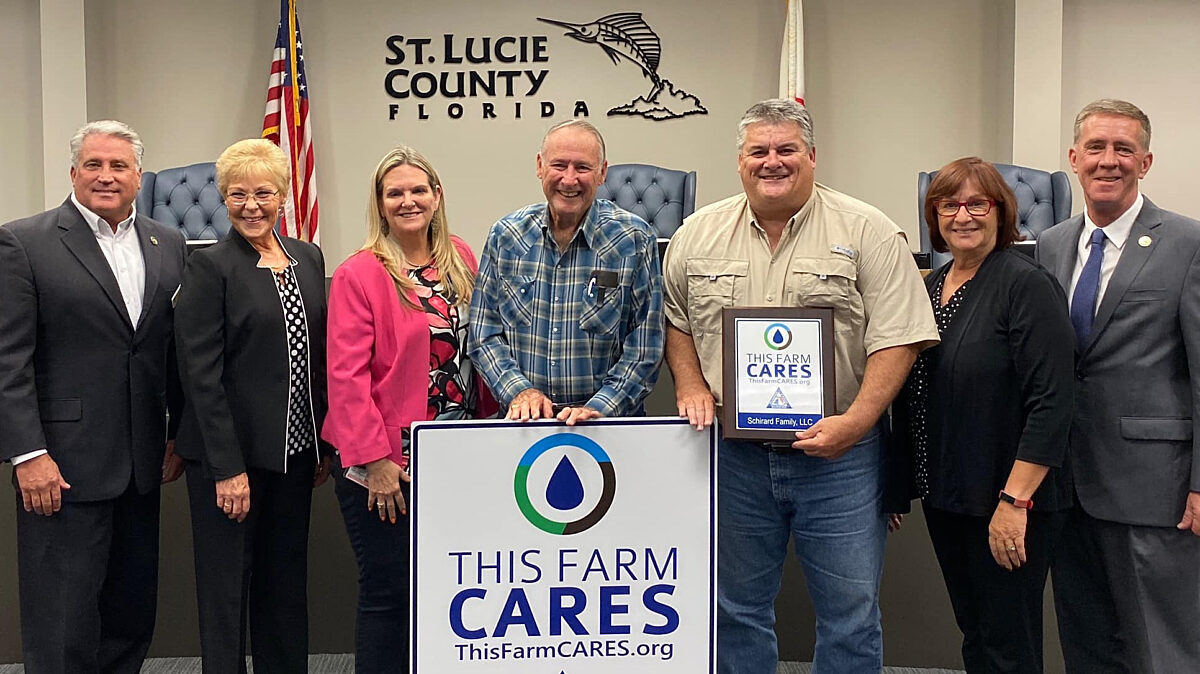Florida Farm Bureau Highlights Farmers’ and Ranchers’ Sustainability Efforts
TOPICS
Water QualityErin Anthony
Director, Communications

The Schirard family, a CARES recipient, is very passionate about preserving Grassy Island, where they grow grapefruit and other citrus.
photo credit: Florida Farm Bureau, Used With Permission
Through the CARES program, more than 900 agriculturists across Florida have been recognized for their superior natural resource conservation. CARES, which stands for County Alliance for Responsible Environmental Stewardship, was created in 2001 by Florida Farm Bureau and the Suwannee River Partnership. The program highlights the many ways farmers and ranchers use best management practices to leave the land and its resources in better shape for the next generation.
“It is imperative to recognize all Florida farmers who go the extra mile in caring for natural resources,” said Florida Farm Bureau President John L. Hoblick. “The CARES award is our way to honor these farmers and ranchers and bring awareness of production agriculture’s commitment to superior natural resource management.”
The Schirard Family
CARES recipients Joseph Brantley and Brant Schirard, a father and son, are very passionate about preserving Grassy Island, where they grow grapefruit and other citrus as part of Blue Goose Growers, a large grower on the east coast of Florida.
“Most farmers want to do it the right way because they’re proud of what they do. Working alongside family makes it even better,” said Brant, president of Schirard Citrus.
Much of the Schirards’ conservation efforts focus on water quality. Excess irrigation water is pumped off of the citrus groves and is sent through a series of canals that utilize native vegetation to filter and capture nutrients. Water naturally flows into and through multiple retention areas where it is again filtered through native wetlands and vegetation, cleaning water effectively.
“We created all these reservoir retentions to purify the water as much as possible, knowing it was going eventually to the ocean, either through the Fort Pierce area or going all the way to Jacksonville, to the St. Johns River,” Joseph Brantley explained.
According to Brant, the water that leaves the property is at least as clean, if not cleaner, than when it got there.
Joseph Brantley’s emphasis decades ago on preserving as much of the property’s natural beauty means the groves aren’t the most efficiently laid out, but he feels he achieved his aim.
“It’s a paradise for the environment. It’s a paradise for the game,” he said.
Brant noted how he proud he is that he can be anywhere on the 3,000-acre property and see the same animals, plants and trees flourishing that he saw when he first set foot on the property.
He gives much of the credit for that to his father, who was concerned about water quality and wildlife habitat decades ago, “because it has always been important to farmers and ranchers.”
Brant said one of his biggest concerns now is keeping his father’s environmental legacy going, noting that his dad implemented these practices when the citrus industry was booming.
“I’m trying to hang onto it in some of the worst times we’ve ever had and still be a good steward of his legacy,” he said.
CARES Partners
More than 60 public agencies have been involved in the program, making CARES a model for similar programs across the country. The agencies involved include USDA’s Natural Resources Conservation Service, the Florida Department of Agriculture and Consumer Services, the University of Florida’s Institute of Food and Agricultural Sciences, the Florida Department of Environmental Protection and Florida’s water management districts, agricultural organizations, businesses and local governments.
Learn more at This Farm CARES.
